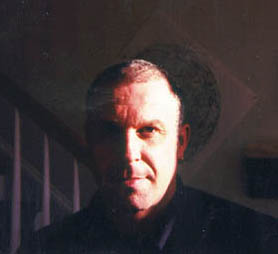
by
Justice Putnam
My second wife and I would spend Memorial Day in France. She is a French National and the bulk of our work was there; well, the bulk of HER work. At the time, I could work anywhere; but that is another story. We would leave the Bay Area around late March or early April and return before the end of September. Sometimes we would celebrate the New Year at a family retreat near the Belgium frontier; and then the next two weeks of Jaunary at another family chateau in Nice. On the 50th Anniversary of the Normandy Invasion, I took this photo that I entitled, National Cemetery in Vanishing Point Perspective, Normandy, France, above the cliffs of the beaches that were once crowded with men, blood, lead and the windy, cold salt air.

I also wrote the following that finally became a song five years ago that goes with the photo:
Josephine
words and music by
Justice Putnam
Josephine
Josephine
I’m pleading
With Josephine
(m/8) Taking the steps
Down to the sea
Somewhere along
The coast of Normandy
Where the white
Fossil sands
Churned turbulently
Where men rushed
Into battle
And died violently
Whose last
Dying breath
Was to plead with
Josephine
Josephine
I’m pleading
With Josephine
(m/8) Could be
The grasslands
Of the Sioux
No matter
Which side
They were on
They were all
Thinking of you
Could be in
In the South Pacific
Or the Persian Gulf
An Indonesian jungle
Or an Arctic hut
Could be in a
Manhattan penthouse
Or a cold water den
(coda) We’ll all grasp
At that last
Bit of hope
In the end with
Josephine
Josephine
I’m pleading
With Josephine
(tacet) Josephine
Take me
Home
© 2005 Justice Putnam
Fleur du Sel Musique
and Mechanisches-Strophe Verlagswesen
The film role was left undeveloped for almost eight years; I had thrown it in a box of to-do creative endeavors that I would attend to eventually.
When my wife, the French actress, Flore De Valicourt

and I decided to end our marriage; I went into a deep funk and could not bring myself to look over those artifacts of our time together. That and many other roles of film, notes and such sat until I was strong enough to remember why I took those photos and made my notes.
Call me a wimp, but I really did love her. One time, we were driving from Paris to La Tranche Sur Mer out on the Atlantic coast and passed through Reims, headquarters of the National Front run by Le Pen.
"Do you smell that?" she asked.
I took a whiff of air and said, "I don't know, what is it?"
"It smells like," she paused momentarily, scrunching her nose in a disgusted expression before continuing, "it smells like, fascism."
I don't know about you; but it made me love her even more fiercely.
Flore told me a story on the way to her mother's family home in Brittany; I took this photo on the way there that is entitled, Tournesol in the Fields of Normandy, France:

and also this one I entitled, House Ruins of Poet St Pol Roux at Brittany France:

Her story became a poem that is emblematic of, for me, the solemnity of Memorial Day:
A Windy Day In Normandy
by
Justice Putnam
Your floral-print dress
A breeze across fields
Of Sunflower and Lavender
You told me the story
Of the tragedy of
Your family
Your grandfather on
His mailman bicycle
The delivery of
Resistance correspondence
The fear of discovery
(The inevitable retaliation
Against the village
An Uncle hung
In the Square
A few weeks short
Of the liberation)
I watched your tears
As you prayed near
The soldier multitude of
White crosses and
The occasional
Star of David
Here and there even
An alabaster Crescent Moon
You wept for them all
As the tournesol
Faced West
Your dress clung in folds
And your red hair
Framed the History
Of your familial grief
(Saint Ceneri, France, 1994)
© 2005 Justice Putnam
and Mechanisches Strophe-Verlagswesen
Though it didn't work out for Flore and myself; she taught me truly what it is to feel reverence for the sacrifice of those in our pasts, our presents and it is sad to say so; in our futures as well.
If that is all I learned; then simply knowing her made me a better man.

© 2010 Justice Putnam
and Mechanisches Strophe-Verlagswesen
(Cut Stone and Arch, St Cenari, France; National Cemetary in Vanishing Point Perspective, Normandy France; Woman on Bicycle, Paris, France; Tournesol in the Fields of Normandy, France; House Ruins of St Pol Roux at Brittany, France; Farm Road and Running Fence. Olema, California / copyright Justice Putnam)
update: this was Rescued on Daily Kos








